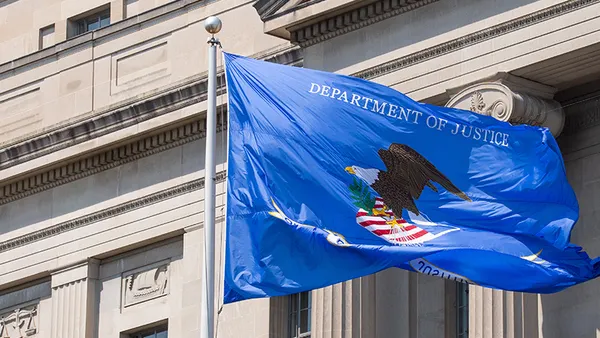Dive Brief:
- Pharmacy associations are coming to the defense of a controversial Iowa law restricting the business practices of pharmacy benefit managers in a case in front of a federal appeals court.
- The National Community Pharmacists Association, Iowa Pharmacy Association, American Pharmacists Association and Independent Pharmacy Cooperative filed a friend-of-the-court brief Tuesday arguing that the law is legal and urging the 8th Circuit Court of Appeals to allow it to stand.
- The groups, which represent independent community pharmacies, say that PBM actions targeted by Iowa’s law are driving unaffiliated pharmacies out of business and harming patient access to drugs. Meanwhile, the employer and health plan plaintiffs seeking to overturn the law argue it will significantly raise costs for businesses by upending prescription drug coverage.
Dive Insight:
Iowa’s law passed in June, called SF 383, overhauls a number of PBM practices.
It requires PBMs let patients to choose the in-network pharmacy of their choice, or from steering patients to a specific pharmacy. It forbids PBMs from paying unaffiliated pharmacies less than it pays its own pharmacies for dispensing a drug, and requires payment to be in line with national averages. It also compels PBMs to pay pharmacists a fee for dispensing drugs.
Under the law, PBMs are required to pay pharmacists a fee for dispensing drugs, and give all pharmacies in a geographic coverage area the chance to participate in its networks. PBMs also have to pass through all rebates they negotiate with drugmakers to their health plan clients.
However, the law never went into effect. Iowa’s largest business association, two health plans and two health plan sponsors quickly filed a challenge in an Iowa district court, arguing that the law violates the First Amendment and is preempted by the Employee Retirement Income Security Act of 1974, or ERISA, the federal law that regulates employee benefits plans.
The district court partially agreed, upholding much of SF 383 while issuing an injunction against certain reforms.
For example, the requirement that PBMs pass through rebate savings to their clients was upheld. But the court enjoined provisions requiring PBMs pay pharmacies the same amount they’re reimbursed by plans for dispensing drugs and barring PBMs from designating medications as specialty drugs to drive business to their own specialty pharmacies.
Anti-discrimination provisions, including that PBMs have to invite willing pharmacies in their networks, were thrown out, as was the requirement that PBMs pay pharmacists a dispensing fee.
The plaintiffs and the defendant, Iowa’s insurance commissioner, cross-appealed in July. And now, major pharmacy groups are joining the fray, contending that PBMs aren’t employee benefit plans but are instead third-party administrators with plans as their clients, so are not under purview of ERISA.
“It’s a flimsy legal argument that was already unanimously rejected by the U.S. Supreme Court in 2020,” NCPA CEO B. Douglas Hoey said in a statement Wednesday, referring to a case called Rutledge v. Pharmaceutical Care Management Association in which the Supreme Court ruled a state law targeting PBMs was not preempted by ERISA.
As such, the court shouldn’t have blocked the pass-through pricing, specialty drug designation, anti-discrimination and dispensing fee provisions in Iowa’s law, the pharmacy groups say.
Their amicus brief also argues that the plaintiffs, which represent businesses and plan sponsors, don’t have standing to challenge the law, which is directed at PBMs.
“There is, in short, no basis to allow Plaintiffs to act as proxies for deliberately absent PBMs. PBMs know how to sue to protect their rights and interests. For whatever reason, they decided not to do so,” the brief reads.
All 50 states have enacted laws targeting PBMs in an effort to lower prescription drug pricing, increase patient access to medications and keep community pharmacies operating, according to the National Academy for State Health Policy. PBMs, which sit in between drugmakers, payers and pharmacies in the U.S. pharmaceutical supply chain, get in the way of those goals, according to the companies’ detractors.
Following a yearslong investigation, the Federal Trade Commission released reports last summer and early this year slamming PBMs for anticompetitive business practices. The reports in particular zeroed in on PBMs’ effects on independent pharmacies.
The largest of the drug middlemen are vertically integrated with health insurers and hold their own pharmacy businesses, giving them financial motivation to steer patients to in-house pharmacies so they can pay themselves for dispensing medications, the report found. They also carry out a practice called spread pricing, in which they reimburse pharmacies less than they’re paid by the plan for a medication and pocket the difference.
In addition, major PBMs wield their market power to strong-arm unaffiliated pharmacies into harmful contracts, pharmacies say.
All told, pharmacy groups largely blame PBMs for rising pharmacy closures. In Iowa, more than 200 pharmacies have closed since 2014, with 34 of those in 2024 alone, according to the amicus brief.
PBMs contend that the U.S. pharmacy market is robust, citing research that independent pharmacies open as frequently as they close.















